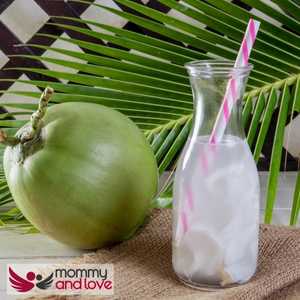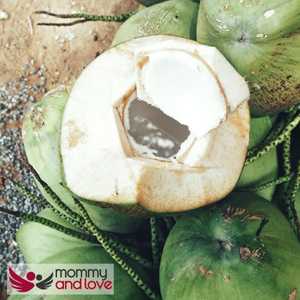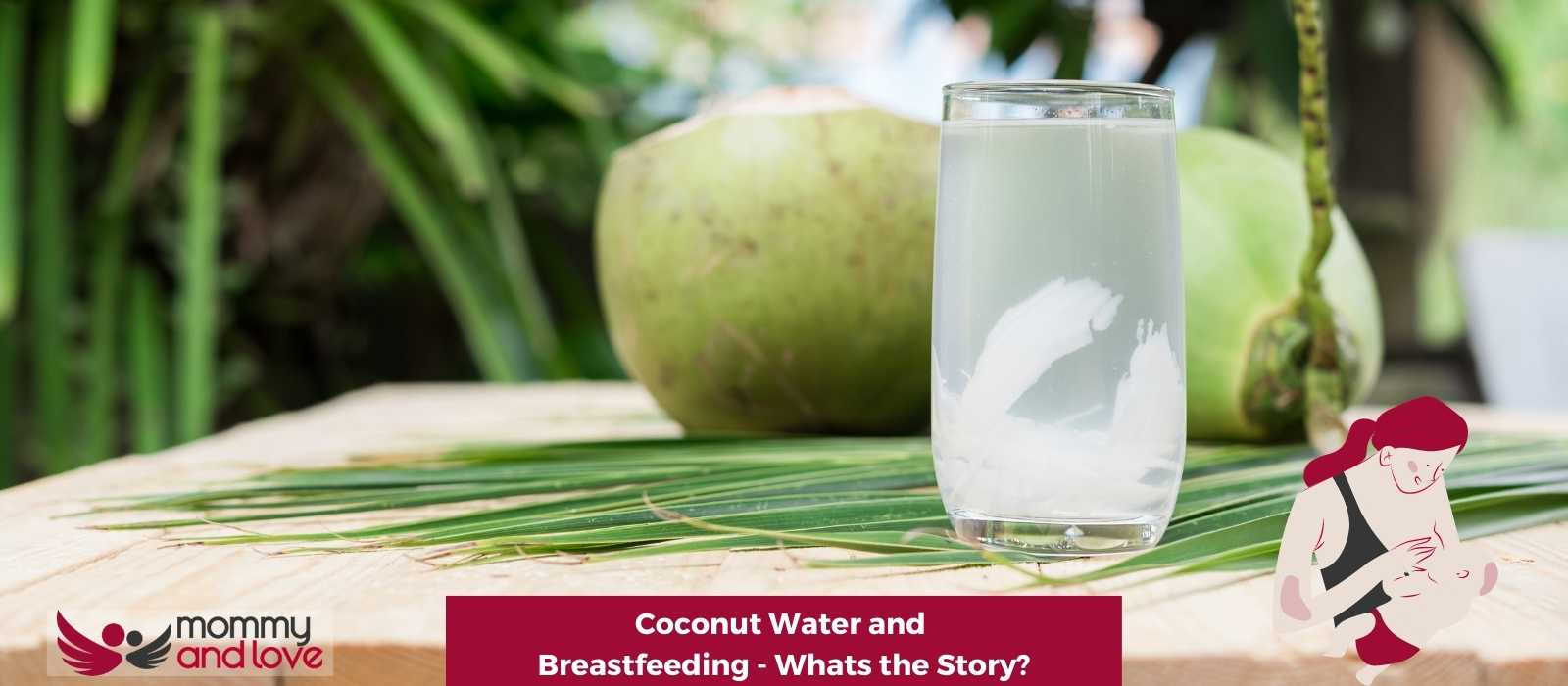Coconut water is a great drink to have while breastfeeding. It contains electrolytes, which are essential for keeping you hydrated and your milk supply up. The potassium in coconut water can also help with milk production. So if you’re looking for a healthy drink to keep you going while nursing, coconut water is a great option.
It’s also worth mentioning that coconut water is a great way to rehydrate after a workout. If you’re a breastfeeding mom who likes to stay active, then coconut water is a must-have drink in your arsenal.
What is Coconut Water?

Coconut water is the clear, slightly sweet liquid inside young coconuts.
It’s been consumed for centuries in tropical countries, and has recently become popular in the United States and other Western countries.
Coconut water is a natural isotonic beverage, which means it has the same electrolyte balance as human blood. It’s a good source of potassium, magnesium, and calcium, and has been shown to have anti-inflammatory and antioxidant properties. Coconut water is also low in calories and sugar.
Coconut water can be consumed fresh from the coconut or used in smoothies, juices, and cocktails. It can also be used in place of other beverages such as plain water, soda, or sports drinks.
Yes, coconut water is good for you. It’s a natural source of electrolytes and essential amino acids and minerals and has anti-inflammatory and antioxidant properties. It’s also low in calories and sugar.
Is coconut water safe while breastfeeding?
Yes, it’s very safe when breastfeeding. Coconut water is a natural source of electrolytes and minerals and has anti-inflammatory and antioxidant properties. It’s also low in calories and sugar. So it would be a great choice to help with hydration while breastfeeding.
Does coconut water increase breast milk supply?
Yes, coconut water increases breast milk supply. Coconut water is a natural drink that is high in potassium, which can help increase breast milk production. It also contains other electrolytes, such as magnesium and calcium, which are beneficial for nursing mothers. Additionally, the lauric acid in coconut water has antibacterial and antiviral properties, making it a great choice for mothers who are trying to boost their immune systems.
Coconut water is a natural diuretic, so it can also help flush the toxins from your body. If you are looking for a healthy drink to help increase your breast milk supply, coconut water is a great option.
If you need to boost your milk supply then along with healthy eating you can drink coconut water to help. Nursing moms should consider a fresh coconut water lactation smoothie which whilst also boosting milk supply will give you a yummy, refreshing healthy drink.
Coconut Water Breastfeeding Lactation Smoothie Recipe Ingredients
- 1 cup unsweetened coconut water
- 1 frozen banana
- 1 tablespoon chia seeds
- 1 tablespoon hemp seeds
- 1 scoop protein powder (optional)
Instructions
Add all ingredients to a blender and blend until smooth. Enjoy immediately!
This lactation smoothie is a great way to get a dose of coconut water, protein, and healthy fats. The chia and hemp seeds are both high in omega-3 fatty acids, which are beneficial for nursing mothers and are all milk supply boosters. The banana provides natural sweetness and potassium. Protein powder is optional, but can help provide energy and nutrients for nursing mothers.
How much coconut water you put into this really depends on how thick you like the smoothie. You can also add in more fruits if you want to make it sweeter, any berries make a love addition and are all good foods for breastfeeding moms.
You can also freeze this smoothie and make popiscles which may great little snacks for summer which also have the benefit of increase milk supply.
Does coconut decrease milk supply?

No, coconut does not decrease milk supply. Coconut is a great source of healthy fats and can actually help increase milk supply. Some women find that consuming coconut oil or drinking coconut milk helps improve milk production.
Drinking coconut water is a very refreshing healthy drink and will keep you hydrated whilst you are nursing.
Benefits of Coconut Water
Despite being high in sugar, coconut water is a natural isotonic drink that provides many benefits. It is low in calories and has no fat or cholesterol. It also contains cytokinins, which are plant hormones that have anti-aging properties. Coconut water helps to regulate blood pressure, improve circulation, and increase metabolism. Additionally, it is a good source of potassium, magnesium, and Vitamin C. Coconut water is a refreshing drink that provides many health benefits. It is perfect for rehydrating after a workout or as a healthy snack.
Coconut is a part of a unique group of foods composed of good saturated fats known as medium chain fatty acids. Coconut water contains these fatty acids, which are metabolized differently than other types of fat. They are absorbed and used directly by the liver, where they are converted into energy. This makes coconut water a good choice for people who are trying to lose weight or manage their blood sugar levels.
Nutrients in Coconut Water
- -Potassium: Can help increase breast milk production
- -Magnesium: Beneficial for nursing mothers
- -Calcium: beneficial for nursing mothers
- -Lauric acid: Antibacterial and antiviral properties
- -Diuretic: Flushes toxins from the body.
What is the Difference Between Coconut Water and Coconut Milk
Coconut water and coconut milk are different products. Coconut water is the clear liquid found inside a young, green coconut. Coconut milk is made by grinding the meat of a mature coconut and adding water. Coconut milk has a higher fat content than coconut water and is thicker in consistency. Coconut milk is a good source of lauric acid, which has antibacterial and antiviral properties.Which is Better for Breastfeeding, Coconut Water or Coconut Milk
Coconut water is a better choice for breastfeeding mothers than coconut milk. Coconut water is lower in fat and calories than coconut milk. It is also a good source of potassium, magnesium, and calcium. Coconut milk is higher in fat and calories than coconut water. It also contains lauric acid, which has antibacterial and antiviral properties.
Either will help you produce breast milk, but drinking coconut water is a lot healthier and will still provide all the essential fatty acids a breastfeeding mother needs.
What Type of Coconut Water is Best?
There are two types of coconut water: young and mature. Young coconut water is sweeter and has more nutrients than mature coconut water. It is also less viscous, making it a good choice for drinking straight from the coconut. Mature coconut water is less sweet and has a more earthy flavor. It is thicker than young coconut water and is best used in recipes.
Coconut water can be purchased in cans, cartons, or bottles. It is also available fresh from coconuts at farmers markets and grocery stores. When selecting a brand of coconut water, be sure to read the label to make sure that it is made from fresh coconuts. Some brands use concentrates or other additives.
Some of the packaged coconut water also have added sugar so always read ingredients when not buying fresh.
Take Away on Is coconut water good while breastfeeding?
If you are looking for ways of increasing milk supply then coconut water drinks could be a really easy refreshing way to increase milk production and have more breast milk and get refreshed and hydrated at the same time. It’s a lot healthier than some fruit juices (and definitely healthier than drinking soda when breastfeeding), contains lots of essential nutrients and many women find it’s one of the nicest breastfeeding drinks to have!

This article was written by Sandra Baker – full time writer and the mother of four amazing kids (including twins!)
She’s also a breastfeeding counselor and has spent years helping new parents learn how to care for their children. When she’s not writing or caring for her children, Sandra likes to spend time reading and taking walks with her husband.




